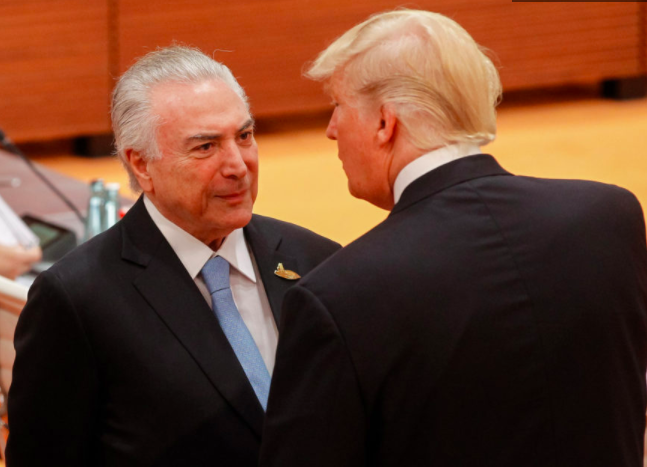On Monday, September 18, Donald Trump will host Brazil’s Michel Temer, Colombia’s Juan Manuel Santos e Peru’s Pedro Pablo Kuczynski for an informal dinner in New York to discuss the crisis in Venezuela. Last month, US Vice President Mike Pence spoke about the topic with leaders in Buenos Aires, Bogotá, Santiago and Panama City. Argentina’s President Macri and Peru’s president Kuczynski, who have met Trump in the White House, have been in touch with the US president on several occasions over the past months to discuss the issue. This is good news: any type of successful regional strategy vis-à-vis Venezuela will require close coordination to have any tangible impact. Trump’s decision to focus on Latin America the night before the General Assembly — a disputed spot in the US president’s agenda — is a sign that the US government regards the situation in Venezuela as growing problem.
Three factors worry the US government: a potential increase of Venezuelans seeking asylum in the United States, the emergence of a narco-state, and the growing geopolitical influence of China and Russia in one of Latin America’s largest economies. Paradoxically, the recent decision to impose sanctions is likely to aggravate at least two of these issues. Maduro himself admits that his government will struggle to circumvent the limitations imposed on the Venezuelan economy. US sanctions will increase human suffering and the number of those hoping to leave — and strengthen Venezuela’s dependence on Russian and Chinese financial help. That is something the three guests should point out to Trump.
Yet while the US president and his guests on Monday will realize that they share a common goal — help Venezuela overcome the economic, humanitarian and political crisis — they are unlikely to agree on much else. Latin American presidents were dismayed when Trump insisted, last month, that he did not rule out a “military option“ in Venezuela. The move predictably helped Nicolás Maduro strengthen his anti-imperial rhetoric and generated unease and condemnation across Latin America. There is a clear perception in Brasília, Lima and Buenos Aires that the President’s temper and unpredictable rhetoric makes cooperating on Venezuela — a sensible and politicized topic across the region — a risky enterprise.
Yet disagreements go beyond Trump’s irresponsible rhetoric. The United States’ decision to impose sanctions against Venezuela — partly the result of Senator Marco Rubio’s focus on the Venezuelan diaspora in Florida — finds little support in Latin America. Brazil, in particular, has traditionally been skeptical of the practice, and it is often forgotten that the country itself was the target of the US sanctions as recently as the 1980s.
The sanctions announced by the US government against Venezuela complicate the South American country’s financial situation, but they are unlikely to lead to its ninth default since 1902. The new restrictions prohibit US-American citizens of companies to trade new Venezuelan bonds, making it harder for PDVSA to refinance its debt burden. Yet the sanctions fall short of a full embargo, which would have a far more profound effect on the Venezuelan economy, almost certainly causing more social instability and even more severe product shortages until Caracas would find alternative buyers of the 700,000 barrels of oil it sells daily to the United States.
While many analysts from around the world continuously predict the chavista regime’s imminent demise, there are several reasons why Maduro can be expected to remain in power for now. The opposition is weak and divided, and the armed forces are making unknown riches from controlling the distribution of food and medicines, having little interest in changing the status quo. Paradoxically, increased scarcity boosts their gains, so they have no interest whatsoever to get the economy back on track. With many unwanted troublemakers migrating to Colombia, Brazil, the United States, Argentina and Spain, and violence against protesters continuing unabated, the days of mass protests are unlikely to return in the near future.
In this context, any attempt to pressure the Venezuelan government to restart a dialogue ahead of regional elections — which will be partially free and are unlikely to change the overall dynamics in the country — seems unrealistic: policy makers in Caracas have little incentive to oblige, and if they do, it will be to win time and divide the opposition further.
In an ideal scenario, Trump, Temer, Santos and Kuczynski would agree on two fairly modest things.
First of all, they should decide to jointly pressure the Venezuelan government to accept humanitarian aid. Reducing human suffering across the country by delivering medicine, vaccines and food will not only limit refugee flows, but also help Brazil and Colombia manage the growing public health crises in their respective border regions. For now, the Maduro government has rejected any kind of aid, as it would imply recognizing the gravity of the crisis. One way to deliver aid, as Matias Spektor suggested at a recent debate at the University of São Paulo (USP), could to invest in so-called “parallel diplomacy”, and incentivize the establishment of channels of communications between Brazilian and Venezuelan armed forces as well as between bishops, who could possibly receive and distribute humanitarian aid. Another option would be to deliver aid to Cuba, which could pass it on to Caracas.
Secondly, the dinner participants should commit to inform each other before taking any significant unilateral action — basically a promise by the US administration to consult or warn Brazil and Colombia (Venezuela’s biggest neighbors) before imposing additional sanctions or taking any other steps that could affect Venezuela’s politics. Anything more ambitious seems to be either unrealistic or undesirable at this point.
Read also:
US sanctions against Venezuela help consolidate Chinese and Russian influence in Caracas
Constituinte assume poderes do Congresso e aprofunda crise na Venezuela
What Russia gains by supporting the Venezuelan regime
Photo credit: Beto Barata/PR – 8.jul.2017









